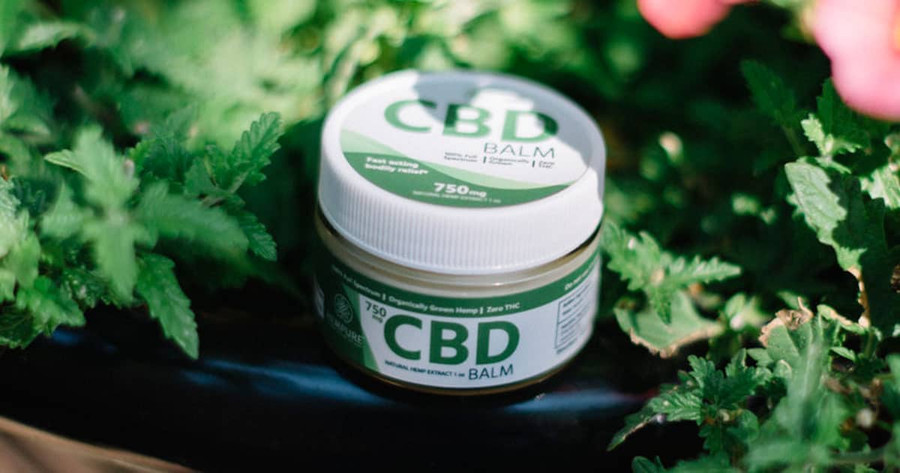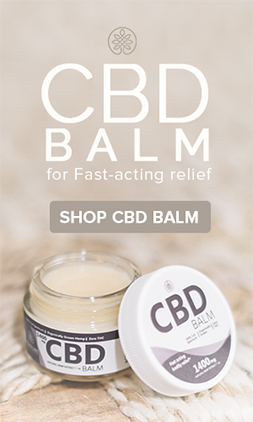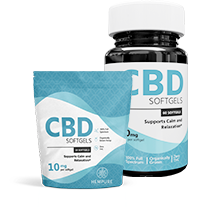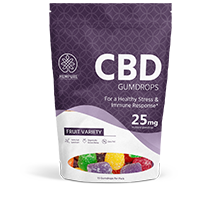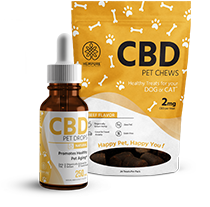What Does CBD Stand For?
Sabina King on Jun 19th 2019
CBD is an abbreviation of the word cannabidiol. Cannabidiol is a cannabinoid. Cannabinoids are a class of chemical compounds that behave in a similar fashion to neurotransmitters in the body. Ok, cannabinoids like CBD are similar to neurotransmitters but what do those do?
CBD = Cannabidiol
The cannabioids don’t only exist in hemp, they also exist within the human body. All vertebrates produce cannabinoids. We refer to these cannabinoids found within the body as endocannabinoids.
These endocannabinoids share a similar structure to the cannabinoids found in hemp - including CBD. Therefore, they have the ability to act within the systems of the human body. The ECS exists throughout all 11 major physiological systems of the body and plays a major role in health.
How CBD oil works with the endocannabinoid system.
What does the endocannabinoid system do?
First, it helps encourage the body's systems to work together and in turn create homeostasis. The majority of health products work to return the body to a state of homeostasis. Subsequently, in this state all of the body’s needs are met and it can function properly.
To be clear, homeostasis is a state of balance. Because of CBD’s similarity to endocannabinoids, CBD can act as a bolster to the endocannabinoid system and help it and all other systems of the body reach homeostasis.
As a result of this, many doctors and scientists believe that CBD holds promise in creating a radical shift in the way we view human health and wellness.
How Can I Benefit From Taking CBD?
Cannabinoids like CBD help establish homeostasis in the body, but what does that look like? What are the actual effects?
CBD Promotes Mental Health

Cannabidiol or CBD acts as a 5-HT1A agonist. An agonist is a substance that creates a response when it interacts with a receptor.2
5-HT1A is a type of serotonin receptor. Hence, when a chemical binds to it, it can cause a change to occur somewhere in the body. 5-HT1A receptors modulate mood, social behavior, appetite, memory, and sexual desire.
There are many periods in life where you may not feel your best mentally. Perhaps this is stress at work, information overload, or just a lack of motivation. Luckily, CBD shows promise in getting you to a positive mental state.
CBD Supports Healthy Skin

Cannabinoids like CBD show promise in supporting healthy skin.3 Skin produces a lipid known as sebum. When too much sebum is produced, blemishes can occur. Because hair follicles and skin glands have endocannabinoid receptors, scientists at the University of Debrecen were curious as to how CBD may interact with sebum production. Consequently, the study suggests CBD could support a healthy level of sebum production.4
CBD Supports The Microbiome

The endocannabinoid system works alongside the microbiome in the digestive system. For that reason, it's important to boost an underperforming ECS with endocannabinoids or phytocannabinoids like CBD. Consequently, the ECS can enhance its performance and the microbiome does the same.
One study discovered that rats saw an increase in the number of endocannabinoids in their microbiome after taking probiotics.5
This indicates that the microbiome and endocannabinoid system have a symbiotic relationship where improving the functioning of one also improves the functioning of the other. By taking CBD and improving the endocannabinoid system, you can also help improve the function of your microbiome.
CBD Promotes Sleep
CBD supports healthy sleep, can help you fall asleep quicker, and thus can help you stay asleep. For example, a study published in the Journal of Clinical Pharmacology discovered that patients that took CBD slept longer throughout the night. Those who took CBD also woke up in the night less than patients who had taken a control.6
The CBD trend
It’s hard to pinpoint exactly when CBD went from being just a topic of interest to researchers to entering the mainstream wellness industry. However, it makes sense considering the high amounts of stress and insecurity that Millenials seem to be grappling with, coupled with a search for natural, non-pharmaceutical alternatives to cope with this stress.
As a wellness product, CBD could definitely provide some benefits, but CBD’s popularity has also led to several businesses jumping on the trending bandwagon to add it to everything. This includes food and drinks like burgers, coffee, and cocktails or beauty products like mascara, shampoo or face wash. The benefits of CBD in these products have not been investigated, and it’s likely that a lot of CBD gets wasted when consumed in these ways.
Better ways to consume CBD oil
More useful ways to consume CBD would be in the following ways:
CBD drops
CBD drops are an easy and versatile way to consume CBD. For therapeutic effects, one can take the drops sublingually, which means under the tongue. Just place a few drops there and hold for about 90 seconds before swallowing. The CBD quickly enters the bloodstream through mucous membranes under the tongue.
CBD capsules
CBD capsules enter the bloodstream by passing through the digestive system. This method of ingestion takes longer than CBD drops to take effect but is nevertheless a very efficient way to consume CBD. One could simply add CBD to their daily dose of multivitamins.
CBD balm
CBD balm is applied to the skin and never actually enters the bloodstream. Instead, it reacts with endocannabinoid receptors underneath the skin. These receptors are responsible for regulating many processes, including sebum production, pain responses, inflammation, itching and hair growth.
How to find quality CBD oil
CBD is currently not regulated by the FDA, which means consumers need to be extra vigilant when choosing a brand to purchase from. Here’s what you need to look out for while scouting for CBD.
Does the CBD come from organically grown hemp?
CBD is derived from hemp, and there are several places companies can source it. Some companies get their hemp from European countries or China. This ends up being cost-effective but the downside is that one can’t be sure what the growing conditions of the hemp are. It’s best to buy CBD that has been derived from locally sourced, organically grown hemp. Why is it so important to know how the hemp has been grown? Because hemp happens to be a plant that sucks toxins out of the soil that it grows in. Polluted soil = polluted hemp = possibly polluted CBD.
Has the CBD been lab-tested?
Even hemp grown in good soil can contain some amount of toxins, microbes or other pollutants. The only way to make sure that all contaminants have been removed during the extraction process is through third-party lab tests on the final CBD product. These lab test results will tell you that the amount of CBD on the label is correct, and it will ensure that the product does not contain any toxins, heavy metals, bacteria or other pollutants.
Concluding Thoughts on CBD
While it may be short for cannabidiol, CBD really stands for a revolution in the way we view health and human wellness.
In conclusion, large populations of people are beginning to utilize CBD for its benefits to balance out the systems of our body, encourage healthy and restful sleep, promote a positive mental state, and support glowing skin.
Give CBD a try today if you’d like to experience some of these amazing benefits.
SOURCES:
- H.R. 2642, Agricultural Act of 2014, https://www.congress.gov/bill/113th-congress/house-bill/2642
- Ethan B. Russo, Andrea Burnett, Brian Hall, Keith K. Parker, Agonist Properties of Cannabidiol at 5-HT1A Receptors, Neurochemical Research, 2005 Aug, https://link.springer.com/article/10.1007/s11064-005-6978-1
- Biro T, Toth BI, Hasko G, Paus R, Pacher P, The endocannabinoid system of the skin in health and disease: novel perspectives and therapeutic opportunities, Trends Pharmacol Sci, 2009 Aug, https://www.ncbi.nlm.nih.gov/pubmed/19608284
- Fred Garner, Cannabidiol As A Treatment for Acne?, O’Shaugnessy’s, 2013 http://www.beyondthc.com/wp-content/uploads/2013/08/CBD-for-Acne.pdf
- Rousseaux C, Thuru X, Gelot A, Barnich N, Neut C, Dubuqouy L, Merour E, Geboes K, Chamaillard M, Ouwehand A, Leyer G, Carcano D, Colombel JF, Ardid D, Desreumax P, Lactobacillus Acidophilus Modulates Intestinal Pain and Induces Opiod and Cannabinoid Receptors, Nat Med., 2007 Jan, https://www.ncbi.nlm.nih.gov/pubmed/17159985
- Carlini EA, Cunha JM, Hypnotic and Antiepileptic Effects of Cannabidiol, Journal of Clinical Pharmacology, 1981 Sept, https://www.ncbi.nlm.nih.gov/pubmed/7028792?dopt=Abstract








